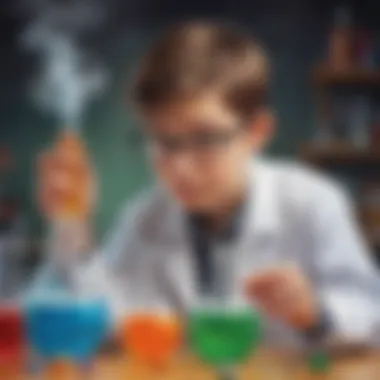Discover a Range of Exciting Science Topic Ideas for Kids to Ignite Curiosity


Fun Activities Ideas
Dive into a world of captivating scientific explorations tailored for children to spark curiosity and ignite a love for learning. Let's embark on a journey filled with interactive experiments, intriguing explanations, and hands-on experiences that will leave young minds enthralled by the endless wonders of science.
Indoor Activities
Explore a realm of indoor activities designed to engage young scientists in exciting discoveries. From creating homemade volcanoes that erupt with bubbly enthusiasm to experimenting with the power of magnets, indoor science activities will cultivate a sense of wonder and experimentation right in the comfort of your home.
Outdoor Adventures
Venture outdoors and dive into a realm of scientific exploration under the open sky. Engage in nature walks to observe plant life, delve into the world of bugs with insect investigations, or conduct simple physics experiments like understanding the power of wind through kite flying. Outdoor adventures bring science to life in surprising and refreshing ways.
Arts and Crafts
Unleash creativity through science-infused arts and crafts projects that blend imagination with discovery. From designing a solar system mobile to crafting handmade paper robots with moving parts, combining artistry with science will inspire young learners to see the creative side of scientific exploration.
Educational Games
Embark on a journey of educational games that make learning a fun and interactive experience. Dive into a variety of math and logic games that challenge young minds, explore language and vocabulary games that enhance communication skills, and engage in stimulating STEM activities that foster critical thinking and problem-solving abilities.
Math and Logic Games
Sharpen math and logic skills through engaging games that encourage strategic thinking and numerical proficiency. From number puzzles to math board games, these activities provide a playful way for children to enhance their mathematical abilities and mental agility.
Language and Vocabulary Games
Expand language abilities through interactive games that promote literacy and vocabulary building. Word searches, language bingo, and storytelling games not only enrich language skills but also foster a love for storytelling and communication.
STEM Activities
Dive into the world of STEM activities that integrate science, technology, engineering, and mathematics concepts into hands-on learning experiences. Engage in building simple machines, constructing bridges, or experimenting with circuits to inspire a passion for innovation and discovery.
Seasonal and Holiday Activities
Celebrate the excitement of each season and holiday with engaging science-themed activities that combine festive spirit with educational fun. Whether crafting Valentine's Day slime, exploring the science behind Halloween costumes, or creating Thanksgiving-themed experiments, seasonal activities bring joy and learning together in unique ways.
Valentine's Day Crafts
Express creativity through Valentine's Day crafts that blend science and artistry. From heart-shaped chromatography to DIY love potions, these crafts not only celebrate the holiday of love but also teach young minds about scientific principles in a whimsical and heartwarming manner.


Halloween Costume Ideas
Unleash imagination with Halloween costume ideas that delve into the world of science and discovery. From creating a superhero inspired by scientific innovation to crafting a space explorer costume, Halloween becomes a celebration of both creativity and scientific exploration.
Thanksgiving Cooking Projects
Celebrate Thanksgiving with cooking projects that infuse scientific inquiry into culinary adventures. From exploring the chemistry of baking to understanding the physics of heat transfer in cooking, these projects turn Thanksgiving into a savory learning experience for children.
Parenting Tips and Resources
Navigate the world of parenting with valuable tips and resources that emphasize the importance of fostering a child's curiosity and passion for learning. Discover ways to encourage creativity, set up playful learning environments, strike a balance between screen time and playtime, build strong family bonds, and motivate kids to stay active through engaging activities.
How to Encourage Creativity
Inspire creativity in children by providing them with ample opportunities to explore and create. Encourage imaginative play, expose them to a variety of artistic mediums, and nurture their curiosity to spark innovative thinking and problem-solving skills.
Setting up a Playful Learning Environment
Create an environment that fosters playful learning by incorporating educational toys, books, and interactive activities into daily routines. Designate spaces for exploration and discovery, encourage hands-on experiences, and allow children to freely express their thoughts and ideas through various creative outlets.
Fun Facts and Trivia
Explore a world of fascinating facts and trivia that ignite curiosity and appeal to the inquisitive nature of young minds. From unraveling the mysteries of the animal kingdom to unveiling stories of famous inventions, historical events, mythical creatures, and space adventures, these snippets of knowledge serve as captivating portals to a universe of endless wonder and discovery.
Introduction to Science Exploration
Exploring fascinating science topics for kids is a pivotal aspect of their educational journey, igniting a passion for discovery and learning at a young age. This article delves into the world of science exploration, emphasizing the significance of introducing children to the wonders of various scientific phenomena. By engaging with hands-on experiments, interactive demonstrations, and insightful explanations, kids are able to enhance their critical thinking skills, problem-solving abilities, and curiosity towards the natural world.
Importance of Introducing Science to Kids
Stimulating Curiosity
Stimulating curiosity in children plays a vital role in fostering a keen interest in science exploration. By encouraging curiosity, young learners are motivated to ask questions, seek answers, and develop a deeper understanding of the world around them. This intrinsic drive to explore and learn is essential for nurturing a lifelong appreciation for science and its marvels. While stimulating curiosity may sometimes lead to unconventional approaches or unexpected outcomes in experiments, it ultimately fosters a sense of wonder and discovery that shapes a child's scientific worldview.
Encouraging Critical Thinking
The importance of encouraging critical thinking in young minds cannot be understated when it comes to exploring science topics. Critical thinking skills empower children to analyze information, draw connections between concepts, and evaluate evidence in a systematic manner. By fostering a culture of critical inquiry, kids learn to approach scientific phenomena with a discerning eye, challenging preconceived notions and cultivating a mindset conducive to exploration and discovery.
Fostering Problem-Solving Skills


Another key aspect of introducing science to kids is the focus on fostering problem-solving skills. Science is inherently about solving puzzles, conducting experiments, and unraveling mysteries through systematic investigation. By engaging in hands-on activities that prompt them to think creatively and analytically, children develop resilience, adaptability, and perseverance when confronted with challenges. Nurturing problem-solving skills equips young learners with the tools they need to tackle complex issues, experiment with innovative solutions, and appreciate the iterative nature of scientific inquiry.
Benefits of Hands-On Science Activities
Enhanced Engagement
One of the primary benefits of hands-on science activities is the enhanced engagement they offer young learners. Through interactive experiments, demonstrations, and projects, children are actively involved in the learning process, which increases their enthusiasm and participation. Enhanced engagement not only makes science topics more compelling and relatable but also improves information retention and knowledge assimilation in a meaningful and impactful way.
Improved Retention of Concepts
Hands-on science activities contribute significantly to the improved retention of concepts among children. By engaging with tangible materials, conducting experiments, and experiencing scientific principles firsthand, young minds are better able to internalize and remember key ideas and theories. This experiential learning approach not only reinforces classroom teachings but also helps children make connections between different scientific concepts, fostering a more comprehensive understanding of the subject matter.
Practical Application of Theory
One of the inherent advantages of hands-on science activities is their emphasis on the practical application of theoretical knowledge. By translating abstract scientific concepts into tangible experiences and real-world scenarios, children gain a more practical understanding of the subject matter. Practical application not only enhances the relevance and applicability of scientific theories but also instills in young learners a sense of curiosity and creativity that drives further exploration and experimentation.
Exploration through Fun Experiments
In this article, the section on 'Exploration through Fun Experiments’ plays a crucial role in engaging young minds in the wonders of science. Through hands-on activities and interactive demonstrations, children not only develop a keen interest in scientific concepts but also enhance their practical skills. The emphasis on exploration through experimentation fosters a deep understanding of scientific principles, making learning both enjoyable and educational.
Simple and Safe Chemistry Experiments
Fizzing Volcano
The 'Fizzing Volcano' experiment serves as an enthralling introduction to chemical reactions for children. By combining common household items to create a bubbling eruption, this experiment captivates young learners and demonstrates the exciting aspects of chemistry. The visual spectacle of the volcano's 'eruption' provides a memorable experience that leaves a lasting impression on children, sparking their curiosity about how substances interact. While being a popular choice for science demonstrations, the Fizzing Volcano experiment also highlights safety measures and the importance of adult supervision in scientific exploration.
Magic Milk Experiment
The 'Magic Milk Experiment' showcases the principles of surface tension and interaction of substances, engaging children in a colorful and mesmerizing display. By adding drops of food coloring to milk and observing the captivating patterns formed, kids are introduced to scientific concepts in a creative and interactive manner. This experiment not only entertains but also educates, demonstrating scientific phenomena in a visually appealing way. Its simplicity and accessibility make the Magic Milk Experiment an ideal option for introducing chemistry to young learners.
Baking Soda and Vinegar Reaction
The 'Baking Soda and Vinegar Reaction’ experiment offers a dynamic experience to children, showcasing a classic chemical reaction in a safe and controlled setting. The effervescent combination of baking soda and vinegar results in bubbling foam, demonstrating the release of carbon dioxide gas. This simple yet impactful experiment not only sparks curiosity but also encourages children to hypothesize and observe changes in substances. Its hands-on nature and immediate visual feedback make it a popular choice for science explorations, highlighting the exciting aspects of chemistry.
Exciting Physics Demonstrations
Balloon Rocket Experiment
The 'Balloon Rocket Experiment’ introduces children to the principles of Newton's Third Law of Motion, emphasizing action and reaction. By constructing a balloon-powered rocket and observing its movement along a string, kids witness the conversion of air pressure into kinetic energy. This interactive experiment not only entertains but also educates on fundamental physics concepts, making learning engaging and immersive. The Balloon Rocket Experiment's straightforward setup and engaging outcome make it a valuable addition to science activities, combining fun and education seamlessly.


Invisible Forces with Magnetism
The 'Invisible Forces with Magnetism’ demonstration unveils the mysteries of magnetic fields and their effects through interactive exploration. By engaging with magnetic materials and observing their attractions and repulsions, children gain insights into invisible forces at play. This experiment prompts curiosity about the nature of magnetic interactions and allows young learners to experience scientific principles firsthand. The hands-on nature of the Invisible Forces with Magnetism demonstration makes it a captivating and educational experience for children, fostering a deeper understanding of physics concepts.
DIY Paper Airplanes
The 'DIY Paper Airplanes’ activity combines the principles of aerodynamics and design, allowing children to craft and test their flying creations. By experimenting with different folding techniques and launch angles, kids explore the factors influencing flight and aerodynamic stability. This hands-on project not only encourages creativity but also introduces basic physics concepts in a practical setting. The DIY Paper Airplanes activity ignites imagination and curiosity, making it a fun and educational way for children to delve into the world of aviation and physics.
Discovery of Natural World
In this section, we delve into the captivating realm of the natural world, a crucial aspect of science exploration for kids. Understanding the natural world not only fosters a sense of wonder but also instills a deep appreciation for the environment and its delicate balance. Exploring ecosystems and habitats allows young minds to observe and learn about the diverse ecosystems that exist on our planet.
Exploring Ecosystems and Habitats
Rainforest Adventures
Rainforests are incredibly diverse ecosystems teeming with life and unique flora and fauna. Rainforest adventures offer children the opportunity to immerse themselves in a lush environment rich in biodiversity. By trekking through rainforests, kids can witness firsthand the intricate relationships between plants, animals, and their surroundings. This hands-on experience not only educates but also instills a sense of responsibility towards conservation efforts. The vivid colors, exotic species, and dense foliage make rainforest adventures a popular choice for young learners eager to explore the natural world.
Ocean Exploration
Ocean exploration unveils the mysteries of the aquatic realm, introducing children to the vastness and complexity of marine ecosystems. By studying coastal areas, coral reefs, and deep-sea habitats, kids gain insights into the importance of ocean conservation and the diverse marine life that inhabits these waters. Engaging in ocean exploration activities such as snorkeling, tide pooling, and studying marine organisms enhances children's understanding of the interconnectedness of marine ecosystems and their significance in sustaining life on Earth.
Desert Ecosystems
Deserts, though harsh and arid, are home to specialized plants and animals adapted to survive in extreme conditions. Exploring desert ecosystems allows kids to appreciate the resilience of desert flora and fauna and understand how these organisms have evolved unique strategies to thrive in challenging environments. By examining desert ecosystems, children learn about desertification, water scarcity, and the importance of conservation efforts in these fragile habitats. Desert ecosystems provide a contrasting perspective to lush rainforests and aquatic environments, showcasing the diversity and adaptability of life on Earth.
Diving into Space and Astronomy
In this section of the article
Innovative Technology and Engineering
In the grand scope of this article centered around exploring fascinating science topics for kids, the segment on Innovative Technology and Engineering assumes a pivotal role in shaping young minds towards embracing the marvels of technological advancements and engineering ingenuity. The introduction to this topic serves as a gateway for children to delve into the realms of coding, programming, and robotics, fostering a deep-rooted curiosity and paving the way for future innovations. By incorporating elements of Innovative Technology and Engineering, children are exposed to real-world applications and problem-solving scenarios, equipping them with essential skills for the digital age.
Introduction to Coding for Kids
Coding Games and Apps
Delving into the realm of Coding Games and Apps within the context of this article, initiates children into the realm of interactive technology by engaging them through gameplay and application development. The key characteristic of Coding Games and Apps lies in its ability to merge entertainment with education seamlessly. By immersing in coding through games and app creation, children enhance their logical thinking, creativity, and problem-solving skills. The unique feature of Coding Games and Apps pertains to its hands-on approach, allowing children to see immediate results of their code and fostering a sense of accomplishment. Its advantages in this article are evident through the engagement and learning retention it offers, making it a popular choice for young learners.
Basic Programming Concepts
Turning the spotlight on Basic Programming Concepts, this subsection emphasizes laying the foundation for understanding the fundamental principles of computer programming. Central to this topic is the development of logical reasoning and understanding of sequential instructions, setting the stage for more advanced coding practices. The key characteristic of Basic Programming Concepts is its structured approach to problem-solving, instilling in children a systematic way of thinking. Its unique feature lies in the simplicity of grasping basic commands and building upon them gradually, leading to a deeper comprehension of coding principles. While offering numerous advantages in terms of building a solid coding groundwork, Basic Programming Concepts also prepare youngsters for more complex programming challenges.
Robotics Workshops
The domain of Robotics Workshops introduces children to the world of automation, robotics, and mechanical engineering. Robotics Workshops are instrumental in bridging theoretical knowledge with practical application, allowing children to construct and program robots, drones, or other automated systems. The key characteristic of Robotics Workshops is the hands-on approach it offers, enabling children to work on tangible projects and witness the direct impact of their coding and engineering skills. The unique feature of Robotics Workshops lies in their interdisciplinary nature, combining elements of coding, mechanical design, and problem-solving. Its advantages in this article encompass promoting innovation, teamwork, and critical thinking, making it a preferred choice for introducing children to the exciting realm of robotics and automation.



